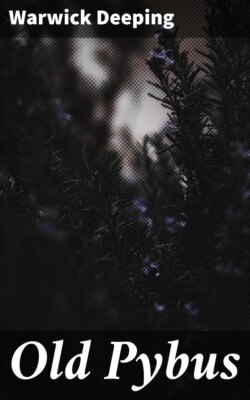Читать книгу Old Pybus - Warwick Deeping - Страница 18
На сайте Литреса книга снята с продажи.
4
ОглавлениеTable of Contents
Beyond the old bowling-green that was now a tennis-court, and the brick and stone Georgian shadow-house with its lead cupola, someone with French feeling had long ago planned a “Bosquet.” Planted with old yews, box and holly, it held at the end of its little secret path a dim and windless space paved with worn flagstones. The white figure of a marble nymph poised upon a pedestal, and half lost in the dark foliage, seemed both to advance and to retreat. A moss-stained stone seat stood in a square recess.
Lance stared at the figure of the marble girl, but at the moment it was no more to him than a white blur contrasting with the dark foliage. His face was very grave. The Bosquet was a favourite retreat of his, with its shadows and silence and its moist green gloom. It smelt of box. It seemed to symbolise the change that had come over him during the last year; he had been conscious of a withdrawing, of a significant aloftness. He had retreated so much more into himself, a new and rather mysterious self. There were times when in one of his fanciful moods he could see himself as a young faun lurking in these thickets and peering out at those other human figures moving in the unmysterious sunlight. He had had qualms, doubts, discomforts. He had a new pair of eyes and a reinformed consciousness. He had been seeing his mother and father as strangers. He seemed to have been making rather shocking and disturbing discoveries. These people of his! How was it? And how beastly of him! To be suddenly ashamed of your father and mother, to be able to see all their weak points, to be vividly and hotly conscious of certain defects! Was he an infernal prig? He had not wanted to see that which a something in himself was compelling him to see. He could not help it. And at times he would feel a sudden rush of tenderness and compassion, impulses of affection that alternated with moods of silent hostility.
Ten minutes ago he had been standing outside the library window listening to the self-revealments of his father and his uncle. His grandfather was alive. That unknown and rather mysterious old man whom he had been brought up to think of as an eccentric bibliophile continued to exist as “boots” at a country inn. An anomalous figure, a figure which appeared peculiarly disconcerting to those two other men! But how, and why? What were the motives that could persuade a man to cut his own father?
And what of his own father? It would appear that Sir Probyn regarded the situation as one that required tactful handling. They ought to do something for the old man. Certainly. But what?
“Well—if you think you can resurrect him after all these years! Have him to live with you, what? Besides, he’d turn you down.”
This had come from Uncle Conrad.
“Most disconcerting, my dear fellow.”
“Call it—an infernal complication. I’d put down three hundred a year to pension the old boy—but I’m damned if I want him living within a morning’s drive of me—as ‘boots’ at a pub. No, it’s not our fault——”
Sir Probyn had allowed that such proximity could not be permitted. Something would have to be done. Should the situation become known it would create a false impression, an unpleasant atmosphere. The world could not be expected to understand old John Pybus’s eccentric stubbornness. The world would think——
“It likes to think its bloodiest,” said Conrad, “especially about successful men like us.”
